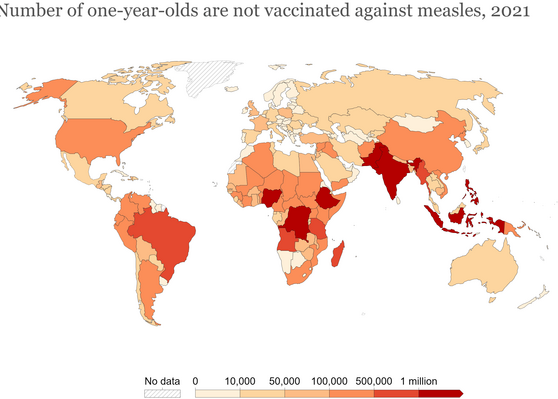
The Resurgence of Measles
Measles, a highly contagious respiratory illness, has made a concerning resurgence globally and in the United States, highlighting vulnerabilities in vaccination coverage and the challenges of maintaining disease elimination. Once declared eliminated in the U.S. in 2000, measles has since re-emerged due to factors like vaccine hesitancy, declining immunization rates, and increased international travel.
A Rising Threat
In the U.S., measles cases have surged in recent years. By mid-2024, 188 cases were reported across 25 states, New York City, and Washington, D.C.—more than triple the total from 2023. Alarmingly, nearly 95% of cases occurred in individuals who were unvaccinated or had unknown vaccination status. The largest outbreak this year occurred in a Chicago migrant shelter, resulting in 57 cases before containment.
Globally, measles cases jumped to 10.3 million in 2023, a 20% increase from 2022. Over 22 million children missed their first dose of the measles vaccine last year, and only 74% of children worldwide received the recommended second dose, far below the 95% coverage needed to prevent outbreaks. Tragically, 107,500 people, mostly young children, died from measles in 2023.
Compounding Challenges
Vaccine hesitancy, fueled by misinformation and the disruptions of the COVID-19 pandemic, has eroded public confidence and immunization rates. These gaps leave millions vulnerable, particularly in under-vaccinated communities. International travel and global outbreaks also amplify the risk of measles spreading to new regions, complicating containment efforts.
The Path Forward
Preventing measles requires a multifaceted strategy. Robust vaccination programs are critical, with the MMR vaccine offering 93-97% effectiveness against measles. Public health officials must also combat vaccine misinformation, enforce stricter vaccination policies, and bolster surveillance systems to detect and contain outbreaks quickly.
Global efforts, such as the Measles & Rubella Partnership, emphasize the importance of high-quality immunization campaigns and disease surveillance. By addressing vaccination gaps, particularly in vulnerable regions, the global health community can work toward the ambitious goal of eliminating measles.
Measles’ resurgence is a stark reminder of the importance of vaccines and coordinated public health efforts. Protecting vulnerable populations requires vigilance, education, and international collaboration to ensure this preventable disease remains in check.
Join the Community – Get Your Weekly Public Health Update!
Be a health leader! Subscribe for free and share this blog to shape the future of public health together. If you liked this blog, please share it! Your referrals help This Week in Public Health reach new readers.



